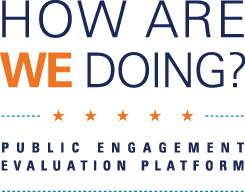Long-time NCDD supporting member Larry Schooler penned a wonderful piece for the Challenges to Democracy blog run by the Ash Center for Democratic Governance & Innovation – an NCDD member organization – and it was too good not to share. In it, he points to the opportunity presented in the President’s recent call for more engagement and aptly compares our work to preventative health care for our democracy. We encourage you to read Larry’s piece below or find the original here.
Is The President’s Call For More Public Participation Within Reach?
 This is America. We want to make it easier for people to participate.
This is America. We want to make it easier for people to participate.
Beyond the partisan divides around some of President Obama’s policy proposals lies a compelling thought: regardless of the policy outcome, give ordinary people safer access to the process. That is an achievable goal – as demonstrated by the many governments who have made it so.
For too long, government has made unrealistic demands of citizens when it comes to their participation. Initially, whole segments of the population could not vote or faced significant obstacles to registration – still an issue in some states. Meanwhile, the only choice many citizens had was to speak for no more than three minutes at a podium – often on live television, after hours of waiting, minutes before a vote.
At one city council meeting in Texas, a speaker at a public hearing asked (in a nearly empty chamber at 11 o’clock at night), “Will there be an opportunity to weigh in on this issue? “I believe you’re doing so now,” replied the mayor. “With any power?” she asked, to applause from fellow citizens and befuddlement from her elected officials.
At work, we don’t limit input to those who can make a speech right before we make a decision, and we shouldn’t impose that limit on the American people, either; that helps “the most extreme voices get all the attention,” as the President put it.
What do we expect when we ask citizens to sit as they would in church, court, or a college lecture, listening to elected officials opine from a dais on high? Only the bravest would openly and brazenly challenge a pastor, a judge, or a professor in those settings.
The changes in attitude the President describes may be hard for government to achieve, but that doesn’t prevent changes in process that would help produce rational, constructive debates, enabling us to listen to more than those who agree with us, and to give the average person more of a say. We should strive to ensure, after all, that those affected by a public policy decision can affect that decision. That’s not the case now in much of our country.
A multi-organizational coalition that included the American Bar Association, the National League of Cities, and the International City County Managers Association produced a set of tools to help make the President’s Dream a reality. Called Making Public Participation Legal, it sought to replace archaic regulations that drive governments to host public hearings rather than facilitate dialogue.
In cities across the country, governments have either replaced or complemented hearings with conversations.
Neutral facilitators help smaller groups of citizens with differing points of view talk to each other respectfully, with discussion guidelines that encourage people to respect points of view other than one’s own, focus on understanding rather than persuasion, and suspend judgment. Moderators even manage to get thousands of people into civil dialogue online through forums set up by local governments to discuss policy challenges.
Some communities even empower ordinary citizens to be the change they want to see in our process – by training them to host dialogue. In Portsmouth, New Hampshire, citizen hosts from Portsmouth Listens held small conversations in people’s homes and resolved major political conflicts through constructive and structured dialogue.
Rather than expecting elected officials both to hold a point of view and to stay neutral among competing interests, many cities have empowered teams of citizen volunteers to facilitate policy discussions at cafes, schools, and houses of worship.
Perhaps most importantly, governments where these changes in public participation have taken hold have laid a solid foundation for change through guiding principles and, in many cases, dedicated personnel. Several organizations, including the International Association for Public Participation, have given governments templates for public participation principles, and more and more cities have community engagement coordinators, offices of neighborhood engagement, and the like.
Ultimately, this paradigm shift can yield more than just warmer feelings among Americans. Governments often spend millions dealing with the consequences of poor public participation – holding off-cycle recall elections, defending against lawsuits filed by aggrieved policy opponents, or even policing protestors.
In an age when we are trying to focus on preventive, ongoing health care rather than the much more expensive emergency room, shouldn’t we do the same for our politics?
Perhaps when Americans demand that their elected officials, from Congress to city council, give them chances to converse, rather than contend, we will achieve the President’s vision. Our civic health is ailing; most Americans don’t vote, let alone stay active in public life away from the ballot box, and many young adults are not leaving home with a firm understanding of civics or with the tools needed to engage in meaningful civic dialogue.
The cure will require all of us – and is well within our reach.
You can find the original version of this piece on the Challenges to Democracy blog at www.challengestodemocracy.us/home/is-the-presidents-call-for-more-public-participation-within-reach/#sthash.jWbgAiMZ.dpuf.





 The first step was figuring out how other people and organizations had done this work, and done it well. We reached out to
The first step was figuring out how other people and organizations had done this work, and done it well. We reached out to 


 The year of 2015 was one of many transitions. NCDD had some personnel changes as we said
The year of 2015 was one of many transitions. NCDD had some personnel changes as we said  NCDD also had a very dynamic year in 2015 in terms of programs and projects. 2015 saw the launch of our
NCDD also had a very dynamic year in 2015 in terms of programs and projects. 2015 saw the launch of our  At this time last year, we began
At this time last year, we began 


 historic opportunity we have right now to “find the public voice that’s missing.” I worked particularly closely on Kettering’s annual A Public Voice event at the National Press Club. Also be on the lookout for a fascinating report on the strategies that public engagement practitioners use to develop productive relationships with public officials over time — a collaboration between NCDD, Kettering, and the Jefferson Center.
historic opportunity we have right now to “find the public voice that’s missing.” I worked particularly closely on Kettering’s annual A Public Voice event at the National Press Club. Also be on the lookout for a fascinating report on the strategies that public engagement practitioners use to develop productive relationships with public officials over time — a collaboration between NCDD, Kettering, and the Jefferson Center.